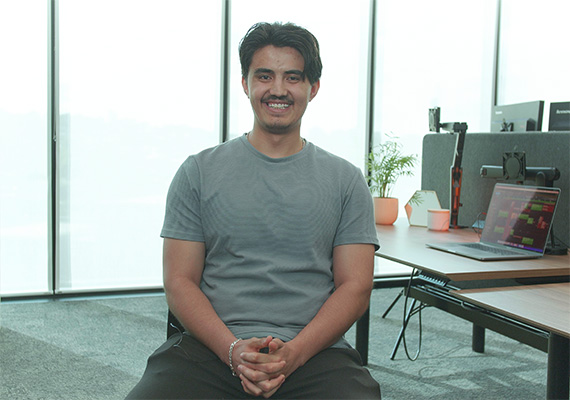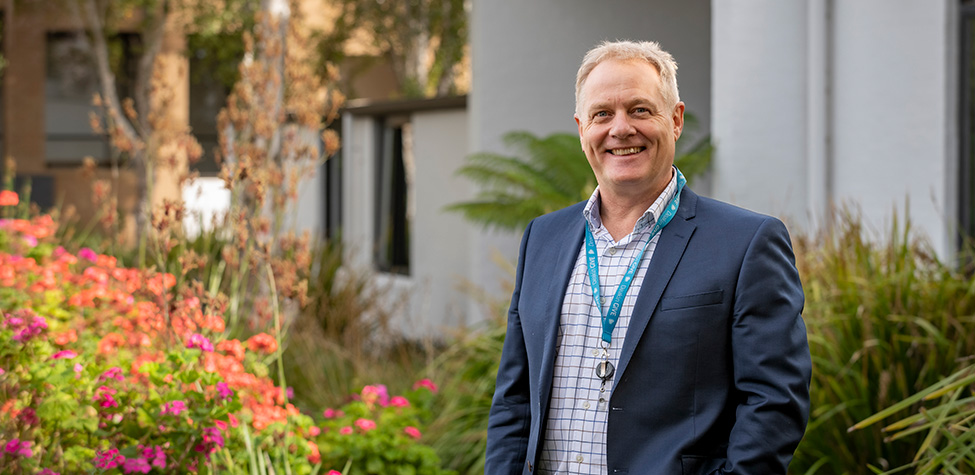For the Head of Deakin’s School of Education, Professor Damian Blake (GCertHigherEd ‘08, PhD ‘05, MEd ‘97 Deakin), joining the University’s GIVE workplace giving program was 'a no-brainer'.
Professor Blake completed his PhD while working full-time as a high school teacher and deputy principal. During this time, he also raised four young children who sometimes accompanied him to work but observes that many of his own students face greater challenges.
Recognising the privilege of working in higher education, he has a drive to give back, by helping to fund programs that can change lives. By participating in GIVE (Generosity + Impact + Values + Empathy) Professor Blake joins colleagues who make a small, regular contribution via their pre-tax pay.
These contributions are used to fund scholarships for students from disadvantaged backgrounds, including those who come to Australia as refugees and asylum seekers.
'In supporting disadvantaged members of our community through workplace giving, it creates change in the world,' Professor Blake says.
'Not just in terms of their family, it also changes the opportunities for young people that they educate. So it does propagate beyond just that one person. The benefits are multi-layered.'

University changed my whole path
Chasing the dream of education, Enayat arrived in Australia, unable to speak a word of English. This is his story of resilience.
Professor Blake wants other staff to consider the value of participating by viewing the benefits to recipients. Afghani refugee Enayat Azimi was only able to attend university through receiving a Deakin Achieving Potential Scholarship (DAPS), another focus of the university’s fundraising work.
Enayat arrived in Australia aged 17 not speaking English, and learning the language as he completed years 11 and 12. Under his visa, however, he wasn’t eligible for HECS, so receiving his scholarship was life-altering: 'It shifted the whole path in the opposite direction,' he says.
Enayat’s goal is to change the 'bad future' his sister and brothers face. 'By the time they will be able to go to university I think I will be able to financially help them,' he says.
Funds provided by DAPS are substantial – $5000 to $10,000 per recipient, per year, whereas the Student Emergency Assistance Fund (SEAF) provides one-off grants of up to $1000 during times of emergency. The Student Emergency Assistance Fund (SEAF) has helped 1074 students from 2020-2022. Students who have needed help with household bills, placement expenses, rent assistance, technology needs, food, medical costs and general living expenses.
Collectively, the Deakin donor community have helped to raise and distribute over $571,009 in emergency grants to date. These numbers not only highlight the significant need for this type of support but also the very real impact communities can make together.
It gave me a push so I can reach my potential and make my family proud.
Enayat Azimi
Scholarship recipient
For those who’ve completed their undergraduate degrees and are just getting started on changing the world through original research, the Early Career Researches Fund (ECRF) supports breakthroughs and innovation.
A focus across different Deakin schools is improving diet and nutrition to reduce chronic diseases. In Dr Christina Zorbas’ (PhD ‘21 Deakin) quest to ensure everyone in Australia can achieve a healthy diet, junior researchers are a valued and integral part of her research team.
With communities reporting that unhealthy food is cheaper, Dr Zorbas, from the School of Health and Social Development, is building Australia’s largest data set, researching food and drink prices over time and into the future.
She praises the PhD students and early career researchers on her team as among the most passionate colleagues she has worked with.
For those with charitable ambitions 'to contribute to the career trajectory of a future community leader and the advancement of society', Dr Zorbas declares, 'this is the right fund for you'.
Interested in finding out more?
Donating to one of our key priority funds allows you to make a positive difference to a student's life in a way that's meaningful to you – whether that's an equity scholarship, life-changing research or providing assistance to a student who's fallen into financial difficulty.

